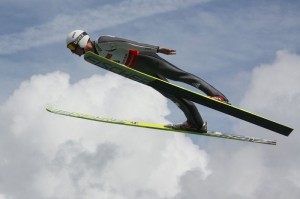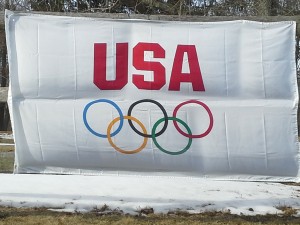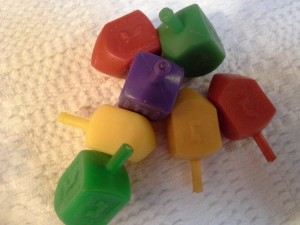I have never been a big fan of watching sports, especially not on television. (Well, I did watch the Super Bowl commercials!) It was a little easier for me in person, but at my son’s early baseball games I remember that I would watch the other parents from the team and shout and clap when they did. 
The Winter Olympics, though, is an exception. The pictures that you see with this article are not of some random athlete. They are of my nephew who is a ski jumper on Team USA. This is his second time at the Olympic Games. The event is only one of the many competitions he enters each year as he travels around the world in search of that elusive top spot.
As my sister and other family members were leaving for Sochi Russia, the rest of the family were sending along their “Best wishes” and “Good Luck” as well as the signature phrase “Fly long.” For some reason I asked my sister what she would say to her grown son right before the first jump. She quietly told me that her final word of encouragement to him is always “Relax”.
Later on as I watched the talking head commentators weigh in on the merits of each contestant, I heard the same sentiment echoed again and again. “She wants it too much. She needs to just relax.” “He is not focusing on what he needs to do. He should just relax and keep his head in the moment.” What a contradiction! In order to go after the gold, you need to let go of thinking about going after the gold.
I began to mull over this conundrum in terms of my own work as a music therapist and as a provider of developmental music experiences for young children and their families. My responsibility in this work is to help children meet individual goals or gain developmental milestones. I feel the burden of ‘making progress’ or ‘meeting benchmarks’ all the time.
But what I have found is that if I go into a session rigidly determined to have the child meet a certain goal it almost always backfires. I get too involved in one little response and how “I can make that happen”. Neither the child nor I get fully involved in the music. The harder I try, the less seems to occur. Conversely when the session is fun and engaging and satisfying musically for everyone, the child intrinsically responds in the way I had hoped for when designing the experience.
You would think that after almost twenty-five years in the field, I would remember this. But I know that I frequently slip and slide down the slope toward checking off items on a list rather than being present and responsive to the child in the musical moment.
So, here is what watching the Olympic Games has taught me to ‘do’ and’ not to do’ that I hope to take into my early childhood music work.
1. Go for the Gold
Go for the gold, don’t go after the gold. Envision the moments of pure musical joy in which each child and grownup is fully engaged. See in your mind the ‘fist-pump’ of elation when everyone is making meaningful music together. Know what each child needs with a clear picture of how that music will look, sound and feel.
2. Create a Training Plan
Figure out the steps and elements needed to get to those great musical moments. Find a coach or mentor to help you. This could be a real person or a book, article or blog. Make sure the steps, or the music experiences, you create will lead to the ultimate goal.
3. Practice, Practice, Practice
This means you as the music therapist or music leader, more than the child, need to practice before each session. The music experiences become part of your musical self. The music is not something that you place ‘on’ the child. It is something that becomes second-nature and free that you share with the child.
4. Relax and Fly Long
Finally you are at the top of the mountain or on the oval of ice or in the circle of children. All of the work preparing for the music now needs to be put aside. Relax! Trust yourself and trust the music. Most importantly, trust that within the music experience, the child will be able to pull out all the stops and rise up to their potential.
So even with all the talk about gold medals, the Olympic athletes tell me that to be successful you need to let go of the medal and focus on the moment.
Go team!







